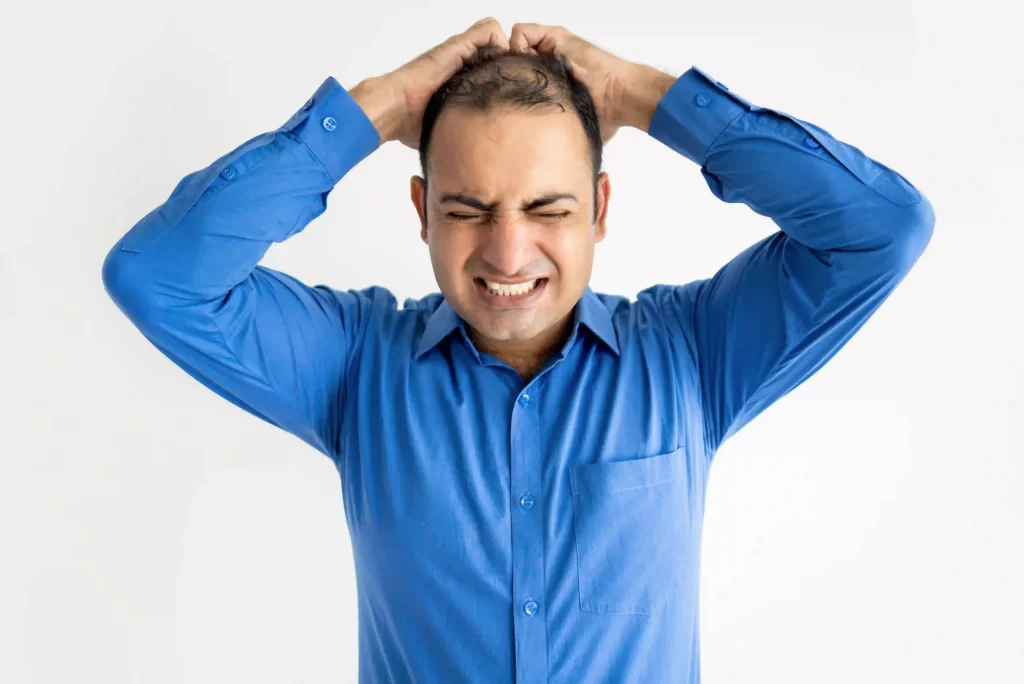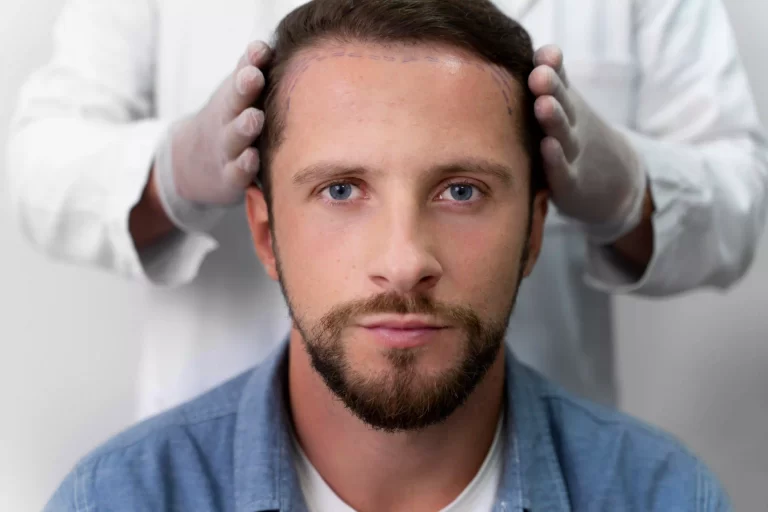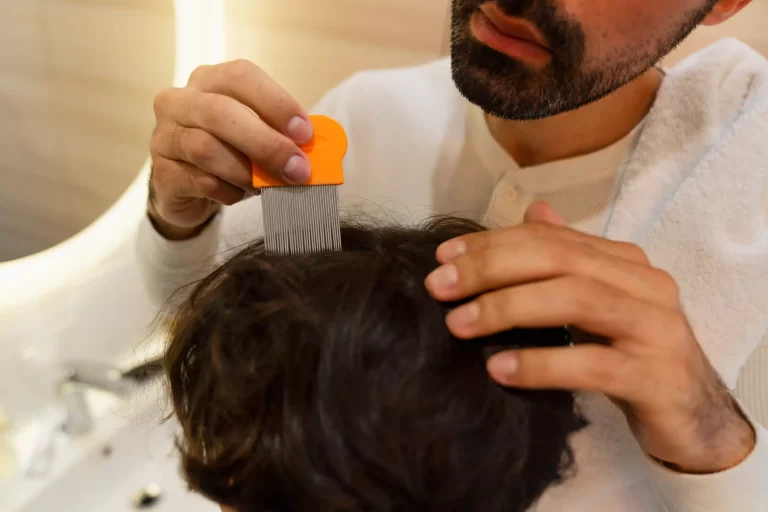Stress and anxiety can affect many parts of our body, including our hair. But does stress and anxiety affect hair loss? Studies suggest they can disrupt the hair’s natural growth cycle, leading to thinning or shedding.

According to UPMC HealthBeat, stress-related hair loss is often temporary and can improve with the right care. Understanding how stress impacts hair health can help us take steps to reduce its effects.
Table of Contents
The Science Behind Stress and Hair Loss
Stress affects your body by releasing a hormone called cortisol. High cortisol levels disrupt the hair growth cycle, pushing more hair into the shedding phase. So, does stress and anxiety affect hair loss? Absolutely. Over time, this disruption can lead to noticeable hair thinning, making stress management crucial for healthy hair.
How Stress Affects the Body
Stress impacts the body by triggering the release of hormones like cortisol, which can disrupt normal functions. High cortisol levels may weaken the immune system, disturb sleep, and interfere with the body’s natural repair processes.
Stress can also harm hair follicles by forcing more hair into the shedding phase. This process, called telogen effluvium, leads to noticeable thinning over time. Prolonged stress may slow hair regrowth, making the problem worse.
The Role of Hormones in Stress-Related Hair Loss
Cortisol, often called the “stress hormone,” plays a big role in how our bodies respond to stress. When stress levels rise, cortisol production increases, which can disturb the natural cycle of hair growth. This may push more hair follicles into the resting phase, causing hair to fall out over time.
Other stress-related hormones, like adrenaline, can also affect hair health. High levels of these hormones may reduce the nutrients and oxygen reaching hair follicles, making them weaker. This can result in thinner, more brittle hair that breaks easily.
Types of Hair Loss Linked to Stress and Anxiety
Stress and anxiety can cause telogen effluvium, where hair sheds due to disrupted growth cycles. Alopecia areata triggers the immune system to attack hair follicles. Trichotillomania involves pulling hair to cope with anxiety, worsening hair loss.
Telogen Effluvium: Stress-Induced Hair Thinning
Telogen effluvium is a type of hair loss where hair falls out in large amounts due to stress. It happens when the hair follicles enter a resting phase, causing more hair to shed than usual.
When you’re under stress, your body produces stress hormones like cortisol. These hormones can disrupt the hair growth cycle, pushing hair into the shedding phase. This can lead to noticeable thinning and hair loss.
Trichotillomania: The Psychological Side of Stress
Trichotillomania, also known as hair-pulling disorder, is when someone feels the urge to pull out their own hair. This can happen due to stress, anxiety, or even without realizing it.
People with trichotillomania often pull hair from their scalp, eyebrows, or other areas. It’s a way to cope with feelings of anxiety or tension, but it can lead to noticeable hair loss and affect self-esteem.
Alopecia Areata: Stress and Autoimmune Response
Alopecia areata is an autoimmune disorder where the body’s immune system mistakenly attacks hair follicles, leading to hair loss. Stress can trigger or worsen this condition by affecting the immune system’s response.
When you’re stressed, your body produces hormones like cortisol. These hormones can confuse the immune system, causing it to target healthy hair follicles. This can lead to sudden patches of hair loss in people with alopecia areata.
How Anxiety Affects Hair Loss
Anxiety can cause hair loss by triggering the body’s stress response. When you’re anxious, your body releases hormones that can disrupt the natural hair growth cycle, leading to hair thinning or shedding over time.
The Connection Between Anxiety and Stress
Anxiety and stress are closely connected. When a person feels anxious, it triggers the body’s “fight or flight” response, which increases stress levels. This extra stress can worsen hair loss by disrupting hair growth cycles.
Chronic anxiety makes it harder for the body to relax, leading to even more stress. Over time, this constant stress can cause the hair follicles to go into a resting phase, resulting in hair thinning or shedding.
Anxiety-Induced Hair Loss: Symptoms to Watch For
Anxiety can cause noticeable hair thinning over time. People with chronic anxiety may experience increased shedding, especially when they’re stressed. You might notice more hair in your brush or on your pillow.
In addition to hair shedding, anxiety can also cause hair to become weaker and more brittle. If you’re constantly feeling anxious, your hair might lose its natural shine and feel thinner than usual.
Managing Stress and Anxiety to Prevent Hair Loss
Managing stress and anxiety is key to preventing hair loss. Regular exercise, deep breathing, and relaxation techniques can help calm the mind. Eating well, getting enough sleep, and staying hydrated also support healthy hair growth. Does stress and anxiety affect hair loss? These lifestyle changes can help improve hair health if stress is a contributing factor.
Stress Management Techniques
Mindfulness can help you manage stress by focusing on the present moment. Simple techniques like deep breathing, meditation, or paying attention to your surroundings can calm your mind and reduce anxiety.
Exercise is another great way to handle stress. Activities like walking, running, or yoga release chemicals in the brain that make you feel happier and more relaxed, helping you cope with life’s challenges more easily.
Anxiety Reduction Strategies
Anxiety can be reduced through deep breathing exercises. Taking slow, deep breaths helps calm your nervous system and lowers stress levels. This simple practice can quickly help you feel more relaxed and in control.
Meditation is another great way to reduce anxiety. Sitting quietly and focusing on your breath can help clear your mind and bring peace. Regular meditation practice can help you manage stress over time, making it easier to stay calm.
Healthy Lifestyle Choices to Support Hair Health
A balanced diet is crucial for hair health. Eating foods rich in vitamins and minerals, like fruits, vegetables, and protein, helps nourish your hair from within. Foods like eggs, spinach, and nuts support strong, healthy hair growth.
Adequate sleep is essential too. When you sleep, your body repairs and regenerates cells, including those in your hair follicles. Aim for 7-9 hours of sleep each night to help your hair grow and stay strong.
When to Seek Professional Help
If your hair loss continues despite trying stress-relief techniques or if it’s getting worse, it may be time to see a doctor or dermatologist. They can help find the cause and suggest the best treatment.
Consulting a Doctor or Dermatologist
If your hair loss is sudden, severe, or worsening, it’s time to see a doctor or dermatologist. They can help identify if an underlying medical condition, like a thyroid problem, is causing the hair loss.
Seeing a professional is also important if you’re feeling anxious or stressed about your hair loss. A dermatologist can recommend treatments, while a healthcare provider can guide you on managing the stress affecting your hair.
Psychological Support for Anxiety and Stress
Seeking therapy or counseling can be a helpful way to manage anxiety that may be causing hair loss. Talking to a professional can help you understand your stress and develop healthy coping strategies.
Therapists can guide you through techniques like relaxation exercises and cognitive-behavioral therapy (CBT) to reduce anxiety. This can not only improve mental health but also support healthier hair growth by managing stress effectively.
Conclusion
Does stress and anxiety affect hair loss? Yes, they can. Stress and anxiety contribute to conditions like telogen effluvium and trichotillomania. When stress hormones rise, they disrupt the hair growth cycle, leading to thinning or even hair loss.
If you’re dealing with hair loss due to stress and anxiety, consider exploring non-surgical hair replacement in Mumbai. A solution like this can help restore confidence and improve your hair’s appearance while addressing underlying concerns.


